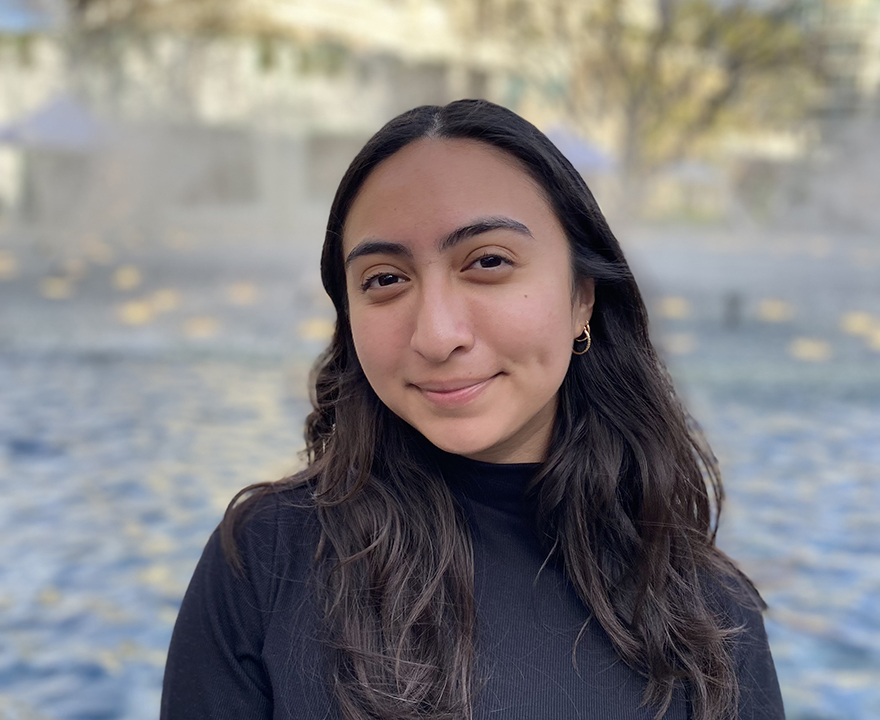Pursuing her passion

Pursuing her passion
- March 19, 2024
- How UCI helped Chicano/Latino studies and psychological science major Andrea Serrano find her fit
-----
When she first came to UCI, Andrea Serrano was unsure which major fit her best. "I initially thought I wanted to do something like bio, and then I ended up not liking it. I was not good at it at all," she said. "And then I found my passion for Chicano studies and psychology."
Now a fourth-year working on completing a double major in Chicano/Latino studies and psychological science, Serrano has realized her true calling. "I really want to do social work in the future," she said. Within social work, she is interested in focusing on healthcare. "I know that even just helping one person is going to help. It's going to make a change in someone's life," she said.
Serrano is part of a research lab on campus called HELIOS, or Healthcare Energized through Listening, Investigation, Opportunities and Services. "We help hypertensive patients in the clinics in Santa Ana and Anaheim," she said. This work inspired her honors thesis, which explores why the Latinx population may not seek medical services as often as they need to.
"I really got my inspiration from them and all of the struggles that they go through," she said. "I'm focusing on language barriers, transportation, and then financial issues and health insurance and how all of that may impact their decision to go to a doctor's office," she said.
Identifying herself as Latina, Serrano has seen this play out firsthand. "My parents are from Mexico. And I've just seen how much they've struggled to go to the doctor's office and not understand their doctor, or not be able to pay for the services that they want," she said. "They really inspired me to figure out more about why others can't do it. I want to see if they're also struggling and if they are, what I could do to help."
Glenda Flores, an associate professor in the Department of Chicano/Latino Studies, invited Serrano to apply for the UC PRIME Pre-Health Pathways Program, which aims to increase underrepresented students’ access to careers in medicine. As a student fellow, Serrano is gaining more experience on the barriers that the Latinx population faces when seeking healthcare.
"I’m learning about health equity and how we can become better healthcare professionals in the future for the community that we want to serve," said Serrano. "It's really nice because it's just other students that also care about health equity and how we want to change the healthcare space for different populations."
According to Flores, Serrano has "far exceeded my expectations as a student researcher, often helping me carry out one-on-one interviews with physicians, code the data and make demographic tables."
"It has been a pleasure to work with her. As the daughter of working-class Latino immigrants, Andrea also served as cultural broker for her parents in the medical and educational arenas," she adds.
Flores has been one of many important mentors for Serrano at UCI.
"[She] has been a really big supporter of mine," said Serrano. "I've been helping her with her project and her book on Latinx physicians. So I've been helping her interview different doctors about their experiences and the differences that they might encounter with other doctors of different ethnic races." Serrano said she has learned much from Flores about how to interview research subjects skillfully.
Joey Leon, Serrano's supervisor at the Student Outreach and Retention Center (SOAR), has been another amazing mentor for her.
"I started my second year at the Student Outreach and Retention Center,” she said. “I feel like I've grown up so much because I've been with them this whole time." Serrano works as both a peer mentor and pathfinder coordinator there. "It's a really awesome space because it's filled with a ton of different populations," she said. "We help underserved students on campus [by] giving them grants, free testing materials, free printing, and it's just a safe space for everyone." In groups, they also help mentor college students in topics like academics, wellness, professional development, and even campus belonging.
With her graduation approaching in June, Serrano has already applied to grad programs at UCLA, Cal State Long Beach and USC. She's hoping to get into a program that she can start this fall. When she does, she'll miss the greenery at UCI, she said.
"We don't really have that in L.A.," she said with a laugh. "But also just keeping up with my mentors as much as I do now, because I won't see them as often as I do. I see them like every week here."
Her support system here has been wide ranging. In addition to Leon and Flores, she's also thankful to John Billimek, principal investigator of the HELIOS lab. "I found the lab, and he was nice enough to welcome me in my second year," she said. "That's been my home ever since I started college because I started during the pandemic."
Serrano is also overflowing with gratitude to her parents, for supporting her through this journey and for coming to the U.S. in the first place to give her this future. But it wasn't until she moved to Irvine that she came to deeply appreciate their culture, which she now sees as her own, too.
"Being in the Chicano/Latino studies department and the major has really helped me feel in community with my culture and being Mexican," she said. "I feel like I didn't really appreciate that part of me until I came here because I've taken so many different classes, and I've learned so much. I'm really lucky to be here."
-Alison Van Houten for UCI
-----
Would you like to get more involved with the social sciences? Email us at communications@socsci.uci.edu to connect.
Share on:


